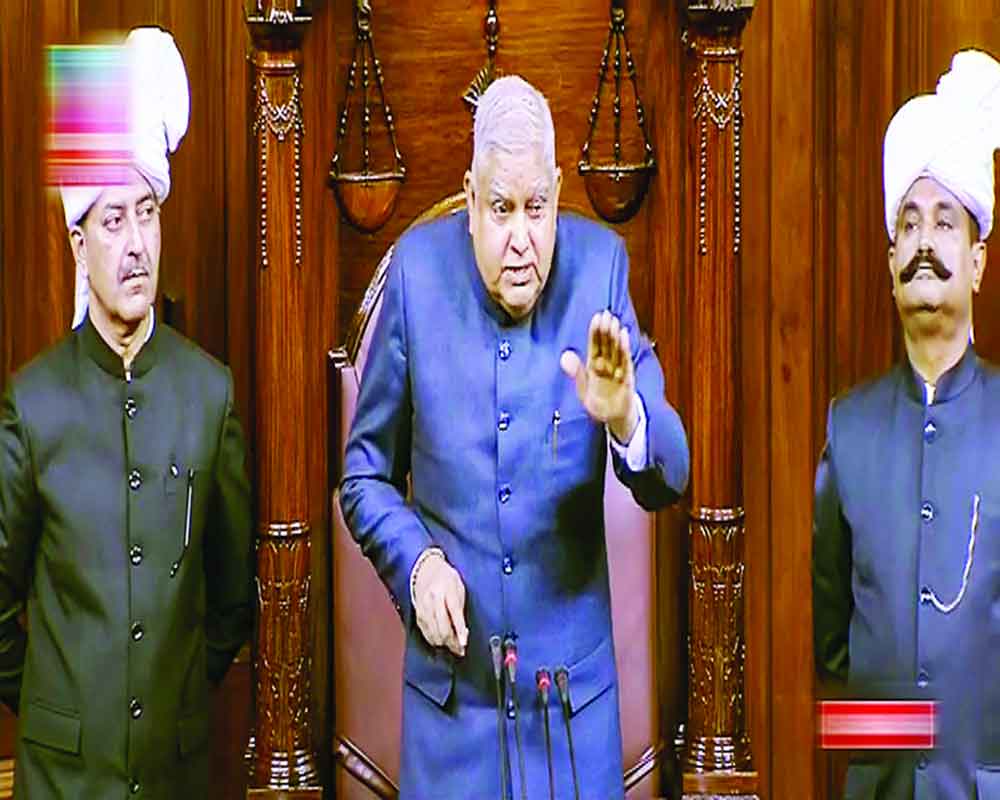In his maiden speech as the Rajya Sabha Chairman, Jagdeep Dhankhar on Wednesday yet again raised the issue of the Supreme Court striking down the National Judicial Appointments Commission (NJAC) Act passed by Parliament.
Terming it a “glaring instance” of “severe compromise” of Parliamentary sovereignty and disregard of the “mandate of the people”, the Vice President stressed upon adherence of the “Lakshman Rekha” among the Legislature, Executive and Judiciary and cautioned any incursion will upset governance “apple cart”.
Referring to the 2015 Supreme Court judgment striking down the NJAC Act, Dhankhar had last week while delivering the LM Singhvi Memorial Lecture, in the presence of the Chief Justice of India, said, “Power of the people, which was expressed through a legitimate platform, that power was undone. The world does not know of any such instance.”
Giving this stern message again, he said Parliament, being the custodian of the “ordainment of the people” was duty bound to “address the issue” and expressed confidence that “it will do so”.
His comments came against the backdrop of recent run-ins between the Government and the judiciary over the appointment of judges.
Dhankhar said it was time for “all Constitutional institutions to reflect and give quietus to public display of adversarially challenging stance/trading or exchange of advisories emanating from these platforms”.
Welcoming Dhankhar as the new custodian of the Upper House, Prime Minister Narendra Modi said he was assuming charge at a time when the country was witnessing two historic occasions, including presidency of the G-20 grouping and “Amrit Kaal” of India’s
independence.
He said it will be period of national development and glory.
Dhankhar said the Rajya Sabha needs to “promote the synergic functioning of constitutional institutions, emphasising the need to respect Laxman Rekha”.
He said, “Democracy blossoms and flourishes when its three facets — the Legislature, the Judiciary and the Executive — scrupulously adhere to their respective domains.”
Pointing out that the “sublimity of Doctrine of Separation of Powers” is realised when the legislature, judiciary, and executive function in tandem, ensuring scrupulous adherence to respective jurisdictional domains, the Vice President went on to say, “Any incursion by one, howsoever subtle, in the domain of the other, has the potential to upset the governance apple cart.”
“We are indeed faced with this grim reality of frequent incursions,” he noted. Dhankhar added that the Rajya Sabha was “eminently positioned to take affirmative steps to bring about congeniality amongst these wings of the governance”.
He asked the members to reflect and engage “in a way forward stance” and pointed out that “Parliament is the exclusive and ultimate determinative of the architecture of the Constitution”.
The Chairman said the essence of democracy lies in the prevalence of the “ordainment of the people reflected through a legitimised platform”, and that parliamentary sovereignty is inviolable in any democracy.
He said the power is “unqualified and supreme, not amenable to executive attention or judicial intervention except for the purpose of deciding any case involving a substantial question of law as to the interpretation of the Constitution envisaged in article 145(3) of the Constitution”.
Dhankhar said Parliament used that Constitutional power to effect “wholesome structural governance changes to further spinally strengthen democracy” by providing a comprehensive mechanism for Panchayati Raj, municipalities and cooperative societies.
“In a similar vein, the Parliament in a much-needed historic step passed the 99th Constitutional Amendment Bill paving way for the National Judicial Appointment Commission (NJAC). There was unprecedented support … On August 13, 2014, the Lok Sabha unanimously voted in its favour with there being no abstention. This House, too, passed it unanimously on August 14, 2014, with one abstention. Rarely in Parliamentary democracy, there has been such massive support for a Constitutional legislation.”
The Supreme Court undid this “historic parliamentary mandate” on October 16, 2015, in a 4-1 majority, “finding the same as not being in consonance with the judicially evolved doctrine of ‘basic structure’ of the Constitution, Dhankhar said.
“There is no parallel to such a development in democratic history where a duly legitimised constitutional prescription has been judicially undone. A glaring instance of severe compromise of Parliamentary sovereignty and disregard of the mandate of the people of which this house and the Lok Sabha are custodians.”


























